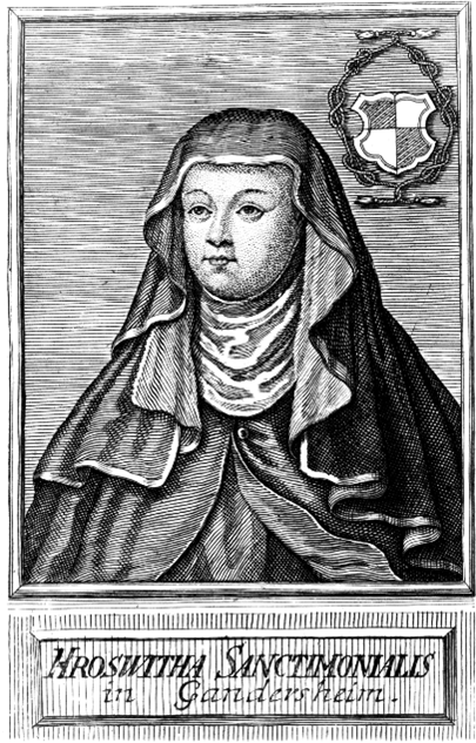April 2025
HROTSVITHA OF GANDERSHEIM:
Intellectual, Nun, Playwright
Written by: D. P. Curtin
Hrotsvitha of Gandersheim, a 10th-century scholar and writer from the Holy Roman Empire, holds a distinguished place in the history of medieval literature. Often regarded as the first known female playwright in Western history, she made significant contributions to both religious and secular literature. As a canoness at the Abbey of Gandersheim, she not only produced works of high literary value but also explored themes of Christian morality, virtue, and the power of women through the lens of classical influence. This essay will delve into Hrotsvitha's life, her primary works, and her lasting influence on literature.
Born around 935 in the region that is now northern Germany, Hrotsvitha came from a noble family, but her name is primarily linked to her time spent at the Abbey of Gandersheim. As a canoness, she was granted an education in Latin, the language of scholarship at the time, and had access to the abbey's library, which housed a wealth of classical and Christian texts. This education enabled Hrotsvitha to write in Latin, a rarity for women of her time, and to develop a literary voice that bridged classical pagan traditions and Christian ideals. The abbey provided Hrotsvitha with a supportive environment where she could cultivate her intellectual and creative talents. Though little is known about her personal life, it is clear that her works reflect a deep devotion to Christian teachings, particularly in the realm of hagiography (the writing of saints' lives), and an engagement with classical traditions, particularly the comedies of the Roman playwright Terence.
Hrotsvitha's primary works include six Latin plays, a number of poems, and historical writings. Her plays are especially noteworthy because they mark her as the first known female playwright in Western history. Written in the tradition of Terence, these plays are heavily influenced by Roman comedy, but with an important distinction: they are not comedies in the traditional sense. Instead, they are serious moral dramas that focus on Christian themes and virtues. In all of these plays, Hrotsvitha emphasizes the importance of Christian virtue, the strength of women, and the possibility of redemption. The characters in her works are typically women who suffer for their faith but ultimately achieve divine reward, a theme that reflects the medieval understanding of sainthood and martyrdom. While Hrotsvitha's plays are modeled after Terence’s comedies in form, they differ significantly in content. Instead of the sexual and humorous themes typical of Roman comedies, her plays focus on piety, virtue, and moral struggles. Hrotsvitha intentionally reframes classical forms to serve Christian purposes, demonstrating how the classical heritage could be adapted to express Christian ideals.
The primary themes in Hrotsvitha's works revolve around Christian piety, the virtue of chastity, the power of prayer, divine intervention, and the triumph of good over evil. These themes are especially prominent in her plays, where the main characters—often women—are placed in situations of moral conflict and face trials that test their faith. These women emerge victorious not through worldly power, but through divine support and their steadfast faith. In addition to promoting Christian virtues, Hrotsvitha’s plays also highlight the moral and spiritual strength of women. Her protagonists are often virgins or women who are martyred for their faith, reflecting her belief in the sanctity of female chastity and the spiritual power of women. This focus on the strength of women in the context of Christianity is one of the most important aspects of Hrotsvitha’s legacy. She provides a narrative where women play central roles as both moral agents and spiritual exemplars.
Hrotsvitha’s works were rediscovered during the Renaissance and received significant attention. Her plays were appreciated for their moral depth, literary sophistication, and unique position as a bridge between classical antiquity and medieval Christianity. She is often credited with being a precursor to medieval mystery plays and a key figure in the development of religious drama in the Middle Ages. Moreover, Hrotsvitha's influence extends beyond her literary achievements. As one of the few female writers from the early medieval period whose works have survived, she stands as a significant figure in the history of Western literature. Her ability to write in Latin and her active engagement with both classical and Christian traditions set her apart as a figure who helped shape the cultural and intellectual landscape of her time.
Hrotsvitha of Gandersheim remains a foundational figure in both medieval literature and the history of Western drama. Her innovative use of classical forms to convey Christian messages, her focus on female protagonists, and her exploration of themes like virtue, chastity, and redemption make her works timeless. As the first known female playwright, she opened doors for women in literature and played a crucial role in the development of medieval religious drama. Today, Hrotsvitha is celebrated not only for her literary achievements but also for her contribution to the intellectual history of the Middle Ages and for her role in elevating the status of women in the literary tradition.

